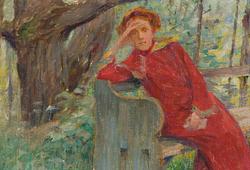Skulptur, brons, den berusade poeten Li Bai, Qingdynastin.
Den berusade poeten avslappnat vilandes mot en kruka, kropsställningen speglas i vecken på hans långa draperade ärmar, hans utsträckta form, långa mustasch och hans halvslutna ögon. Träställ vackert snidat med lingzhi-svamp och genombrutna formationer. Längd 21, höjd 13 cm. Höjd inklusive ställ 20 cm.
Övrig information
Li Bai (Chinese: 李白 701–762), also known as Li Bo, Taibai (太白), was a Chinese poet who is considered one of the greatest and most influential poets of the Tang dynasty – and in the entire history of Chinese literature. Along with his friend Du Fu (712–770), he was one of the most prominent figures during the Tang Dynasty, the golden age of Chinese poetry. The expression "The Three Wonders" refers to Li Bai's poetry, Pei Min's swordsmanship, and Zhang Xu's calligraphy. Li Bai's poems became models for celebrating the joy of friendship, the depth of nature, solitude, and the pleasure of drinking. Some of his most famous works are "Waking from Drunkenness on a Spring Day" ( 春日醉起言志), "The Hard Road to Shu" ( 蜀道难), "Bring in the Wine" (将进酒), and "Quiet Night Thought" ( 静夜思), which are still taught in schools in China. In the West, multilingual translations of Li Bai's poems continue to be made. His life has taken on an almost legendary character, with tales of drunkenness and chivalry, as well as the well-known story of Li drowning while reaching from his boat to catch the reflection of the moon in the river while drunk.

























































